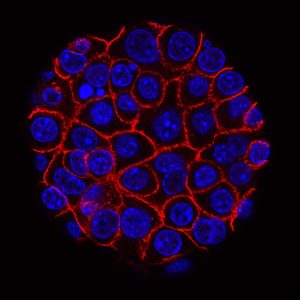
Pfizer’s Ibrance combo fails to improve overall survival in HER2- metastatic breast cancer
pharmafile | June 26, 2018 | News story | Manufacturing and Production, Research and Development, Sales and Marketing | AstraZeneca, Faslodex, Pfizer, breast cancer, ibrance, pharma
Pfizer has stumbled with the reveal of new data on the efficacy of its oral CDK 4/6 inhibitor Ibrance (palbociclib) in combination with AstraZenenca’s Faslosdex (fulvestrant) as the company confirmed the therapy had failed to meet its Phase 3 secondary endpoint of overall survival in breast cancer.
Specifically, it was revealed that while the combo showed a “positive trend” in overall survival, it failed to reach statistical significance in hormone receptor-positive (HR+), human epidermal growth factor receptor 2-negative (HER2-) metastatic breast cancer. The combo hit its primary endpoint of progression-free survival earlier in the trial, with results published in 2015.
“The duration of the survival in hormone receptor-positive metastatic breast cancer patients, and the potential for subsequent therapies to confound overall survival outcomes, make demonstrating statistically significant improvement in overall survival extremely difficult,” commented Dr Nicholas Turner, Professor of Molecular Oncology at The Institute of Cancer Research, London, a Consultant Medical Oncologist at The Royal Marsden NHS Foundation Trust, and a principal investigator of the Paloma-3 trial. “The results from this overall survival analysis support the strong progression-free survival results from Paloma-3 and, while not statistically significant, are encouraging for physicians and patients. We look forward to presenting the detailed data at an upcoming medical meeting.”
Dr Mace Rothenberg, Chief Development Officer, Oncology, Pfizer Global Product Development, also added: “While the difference in overall survival narrowly missed the threshold for statistical significance – a high bar for any trial in this patient population – it is similar, in absolute terms, to the improvement in median progression-free survival previously demonstrated in this trial.1 We are encouraged by these results, which build on the compelling clinical benefit delivered by Ibrance. Ibrance in combination with endocrine therapy has transformed the treatment landscape for patients with HR+, HER2- metastatic breast cancer.”
Matt Fellows
Related Content

EC approves Pfizer’s Emblaveo for multidrug-resistant infection treatment
Pfizer has announced that the European Commission (EC) has granted marketing authorisation for Emblaveo (aztreonam-avibactam) …

AstraZeneca shares results for Imfinzi in phase 3 trial for small cell lung cancer
AstraZeneca has announced positive high-level results from the phase 3 ADRIATIC trial, which demonstrated that …

FDA accepts BLA for AstraZeneca and Daiichi Sankyo’s datopotamab deruxtecan for breast cancer treatment
AstraZeneca and Daiichi Sankyo have announced that their Biologics License Application (BLA) for datopotamab deruxtecan …







